
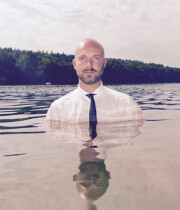 Matthijs Wouter Knol
Matthijs Wouter KnolMatthijs Wouter Knol is director of the European Film Market (EFM). Since 2001 Matthijs Wouter Knol has worked as creative producer on numerous documentary films in Amsterdam. He was in charge of the complete digital re-mastering of the works of Dutch documentarian Johan van der Keuken in collaboration with the Dutch Filmmuseum and Idéale Audience, winner of the Cahiers du Cinéma Prize (2006). In 2007, Knol started working for the International Documentary Film Festival Amsterdam (IDFA) and initiated the successful IDFAcademy Summer School. From 2008 to 2014 he was programme manager of the Berlinale Talents summit, studios and labs and is a co-founder of the Berlinale Residency programme (2012). At the helm of the EFM since 2014, Knol’s main focus has been to adapt one of the world’s major film markets to the quickly changing film industry. Apart from adding niche markets for high-quality drama series, the EFM has expanded its portfolio with the new innovation platform EFM Horizon, focusing on discovering relevant partners for the industry of tomorrow.
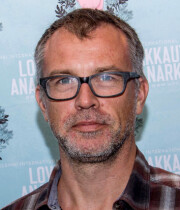 Rickard Olsson
Rickard OlssonRickard Olsson has worked in a variety of roles within the European film industry since the mid-1990s, including film funds and institutions such as Film i Väst, the Swedish Film Institute, Creative Europe – MEDIA Programme, and as Head of Studies for Maia Workshops, a programme for emerging European producers. He lectures at training initiatives and consults companies and institutions on project development, financing and distribution. Since 2014, he's been managing international acquisitions for Picture Tree International GmbH, an integrated world sales and production company with headquarters in Berlin. The company was founded in December 2012 and currently represents up to 12 theatrical feature films per year, ranging from mainstream to arthouse cross-over productions.
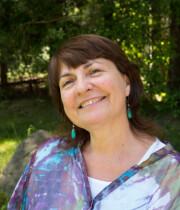 Rossitsa Valkanova
Rossitsa ValkanovaRossitsa Valkanova graduated in 1982 from NATFA, Sofia as a film director. She worked as AD in Ekran film studio until 1990 and directed several short films. In 1995 she founded the KLAS Film production company, working with prominent directors such as Ivan Cherkelov (Crayfish, 2009), Vassil Zhivkov (Christmas Tree Upside Down, 2006 – Special Jury Prize at KVIFF), and Iglika Triffonova (Letter to America, 2001, Investigation, 2006, The Prosecutor, The Defender, The Father and His Son, 2015, Lift for Patients, 2017), as well as with debutants such as Dragomir Sholev (Shelter, 2010 – WP for New Directors at San Sebastian) and Ralitza Petrova (Godless, Golden Leopard for Best Film in Locarno 2016). Most titles have been co-produced with partners from Holland (Phanta Film), Germany (Flying Moon, Filmkombinat), Hungary (New Budapest Filmstudio), Sweden (Filmlance International), and Denmark (Snowglobe). KLAS Film works as delegate producer for domestic and foreign productions (Tilt, 2010, dir. Victor Chuchkov, How I Killed a Saint, 2002 and I Am from Titov Veles, 2007, dir. Teona Strugar-Mitveska) and has co-produced as minority partner on Blind, 2007, dir. Tamar van den Dop and Aferim!, 2015, dir. Radu Jude (Silver Bear for Best Director at Berlinale 2015).
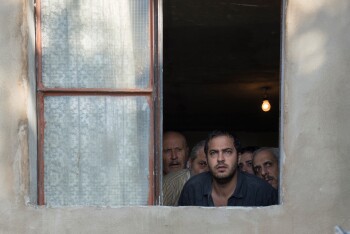
Lebanon, July 2006. War is raging between Hezbollah and Israel. During a 24-hour ceasefire, Marwan heads out in search of his father, who has refused to leave his Southern village, leaving his wife Rana alone to prepare their immigration to Canada. Marwan finds no traces of his father and the ceasefire is quickly broken, forcing him to take shelter in the house of Najib, his father’s friend. Marwan finds himself trapped under a hail of bombs with Najib and a group of elders, friends of his father. Tension rises inside and outside of the house. Suddenly, a group of Israeli soldiers enter the first floor. The next three days sees the situation spiral out of control.
Ahmad Ghossein is a Lebanese filmmaker and video artist. He has directed several documentaries, short films and videos. His work has been screened in different museums, galleries and film festivals around the world – to mention a few: MoMa in New York, Kunsthallen in Oslo, and Berlinale Film Festival, Berlin. His shorts My Father is Still a Communist and The Fourth Stage screened at many film festivals. In 2017, Ahmad was selected from among four Lebanese filmmakers of the Lebanon Factory, and co-directed White Noise with Lucie La Chimia that opened the Directors’ Fortnight at Cannes Film Festival 2017.
Myriam Sassine majored in cinema studies at the Lebanese Academy of Fine Arts and received an M.A. in cinema research. In 2010, she worked in content development with Lucky Monkey Pictures (USA) and in 2012 she became a producer at Abbout Productions, where she worked on several features such as Tramontane by Vatche Boulghourjian (Cannes Critic’s Week 2016), Panoptic by Rana Eid (Locarno 2017, Sheffield 2018), A Certain Nasser by Badih Massaad and Antoine Waked (Festival Lumière 2017, Cairo Film Festival 2017) and Amal by Mohamed Siam (Idfa 2017, Hot Docs 2018). Myriam is the COO of Schortcut Films, dedicated to co-producing international features. She is also the executive director of Maskoon Fantastic Film Festival, the first festival of fantastic film in the Middle East.
I remember my mother standing before the ruins of her house, after the war of July 2006, searching for her family photo album. She turned to me and said: “War isn’t only death and destruction; it’s the disappearance of memory. I don’t want my memory to be erased.” Houses had been gutted, entire villages destroyed. Seeing all of this, I felt a need to use my camera to revive this memory and try to ward off the destruction. This is also perhaps why Marwan goes in search of his father – to save what’s left of his integrity and what’s left of their relationship. My film asks whether the only option left for my generation and that of our children in today’s Lebanon is to leave. Is this our only choice?
Abbout Productions
Madrid Street, Mar Mikhael Azirian building, 2nd floor, 1100, Beirut, Lebanon
Email: [email protected]
Mobile: +961 144 7824
 Myriam Sassine | Producer
Myriam Sassine | Producer
Email: [email protected]
Mobile: +96 13 570 020
 Ahmad Ghossein | Director
Ahmad Ghossein | Director
Email: [email protected]
Mobile: +96 13 225 381
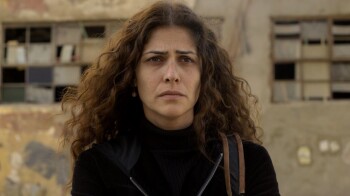
Hala has been living with the fear of abandonment since her father passed away when she was 18. She has clinical depression and tries to commit suicide several times, but she never goes all the way; she always leaves a little room for someone to rescue her. Now her loving husband, who would always come to the rescue, is facing trial for a simple mistake at work and she’s left alone with her suicidal thoughts and a six-month-old daughter. She must find a way to change in order to carry out her duties as a mother and as a good wife to her jailed husband. Hala’s main problem lies in facing herself, her fears and depression, and being there for her husband and her daughter.
Hisham Saqr was born in Cairo. He has more than ten years of experience as an editor in the Egyptian film industry. Saqr has worked with a number of acclaimed Egyptian directors, most recently with Ahmad Abdalla on the award-winning Rags and Tatters (2013). The two previously collaborated on Microphone (2010), for which Saqr won the award for best film editor at the Dubai International Film Festival. He also edited Ibrahim Al Batout’s Winter of Discontent (2012), which earned Saqr a Best African Editor nomination from the 2013 African Film Development Foundation Awards. His directorial credits also include one short. Certified Mail is his first feature film.
Hisham Saqr started the project with his own company (White Feather) then joined the production of Mohamed Hefzy’s Film Clinic, the award-winning company that has participated in many international festivals including Cannes’ Un Certain Regard with Clash as an opening film in 2016 and Youmeddine in the main competition in 2018. Along the way, Mohamed Samir (DayDream Art Production) came on board as a co-producer. Samir has produced Factory Girl for the acclaimed Egyptian director Mohamed Khan and since then he has been focusing on 1st and 2nd time films for new upcoming directors.
I made a film about the idea of loss and how one can surprisingly find the inner strength to deal with it. It is about how a normal person who is emotionally fragile copes with this; incomprehensible emotions such as anxiety and depression that lead to suicidal thoughts. I have personally gone through all these feelings and thoughts so I started to think: What if the main character was a woman who has just had a child? Society is asking a lot of her, especially when being a mother and having her own child adds much more to the illogical fear and anxiety of losing even her own new-born girl. These complex emotions and how she finds a way to cope with them is what I am examining in my film.
White Feather Film Production
Cairo, Egypt
Email: [email protected]
Mobile: +201 277 706 343
Film Clinic
141(A) Corniche El Nile, 9th floor, Maadi, 11511, Cairo, Egypt
Email: [email protected]
Mobile: +20 225 268 050
 Hisham Saqr | Director
Hisham Saqr | Director
Email: [email protected]
Mobile: +201 277 706 343
 Mohamed Samir | Co-Producer
Mohamed Samir | Co-Producer
Email: [email protected]
Mobile: +33 786 895 871
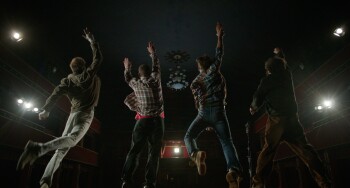
Kosovo is on the verge of war. Dodona Theatre, the last remaining public institution, is closed down. However, the play The Flying Circus, inspired by famous British TV series Monty Python’s Flying Circus, produced by four young actors, is invited to the theatre festival in neighbouring Albania. Traveling to Albania poses a great danger, but when the actors receive news that their idol Michael Palin of Monty Python will be filming in Albania during that period, it changes their perspective. Planning to meet their idol, they decide to go. Nonetheless, nothing goes according to their plan.
Fatos Berisha is a film, television and theatre director with an MA in Directing from the University of Pristina. He attended professional courses at the Royal Court Theatre, London in 2000 and at the National School for Film and Television, London in 2002. He has worked in theatre, television and film. He directed 280 episodes of the famous Kosovar TV series Familja Moderne and the 60-minute film Blood Pressure for public television in addition to more than 20 theatre plays. He is co-founder and artistic director of Prishtina International Film Festival (PriFest) and head of PriFORUM, the regional industry platform of PriFest. He was also the director of Kosovo Cinematography Center (2011–2013). Berisha is a member of the European Film Academy (2011).
Vjosa Berisha is producer and chief executive of the B2 Kosovo / Albania production house. Co-founder and festival director of Prishtina International Film Festival – PriFest (2008). Berisha possesses an MA in Communication, University of Westminster, London UK and PGD in Contemporary Diplomacy, University of Malta. EAVE Producers Workshop graduate (2015). Feature films: Co-producer of Son by Ines Tanovic, in pre-production; producer of The Flying Circus by Fatos Berisha in post-production; co-producer of The Happiness Effect by Borjan Zafirovski in post-production. Producer of documentaries and other commissioned work by various clients and institutions in Kosovo. Member of the European Film Academy (2013).
This is a true story and I was a part of it, or rather: a witness. A surreal journey on the verge of war, four actors embark on a dangerous trip, crossing Balkan borders illegally to get to a theatre festival. The leitmotif of this whole story is the legendary British series Monty Python’s Flying Circus, or rather one of the Pythons, Michael Palin. The possibility of meeting their idol, Palin, reshuffles their perspective of danger and “patriotism”. As a witness to the whole journey, I wrote and also filmed it in the same fashion: the camera as the fifth person. Surreal, often comic and sad, the story unfolds at the end of ‘90s in troubled Kosovo through the eyes of four young actors without seeing the actual war.
B2 Films
Mother Theresa Boulevard RTK building 7th floor 74, 10000, Pristina, Kosovo
Email: [email protected]
Mobile: +38 649 506 767
 Vjosa Berisha | Producer
Vjosa Berisha | Producer
Email: [email protected]
Mobile: +38 649 506 767
 Fatos Berisha | Director, Scriptwriter
Fatos Berisha | Director, Scriptwriter
Email: [email protected]
Mobile: +38 649 344 558
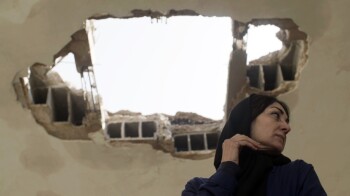
“I am a woman with oil coming out of her body and whose husband has disappeared,” repeats Foziye, describing the reason she must emigrate to Germany. Foziye is in her 50s and is trying to find her missing husband under the pretext of having something extremely important to tell him. Her terrible secret is not revealed until the day her daughter and sister find out that she has a body that produces crude oil. Oil, a vital substance, then becomes the centre of petty family issues until the day Foziye’s body stops functioning altogether, bringing other characters to the forefront in the ensuing mayhem.
Suzan Iravanian. Born in 1985 in Shiraz, Iran, Suzan Iravanian holds a BA in art and architecture; she received an MA in cult film from Brunel University and an MA in filmmaking from the New York Film Academy. Since 2009 Iravanian has been involved in the production of shorts and in 2015 she started her first feature film. Iravanian is also a writer, photographer and graphic designer. The 4th Character, 2009. writer, director and editor. Produced by New York Film Academy, set in the urban construction of Abu Dhabi. The Floating Volume, 2009. Writer, director and editor. Produced by New York Film Academy. Screened at Emirati Impressionist Exhibition, Emirates Palace, Abu Dhabi, 2009. Songs from the Layers of Language, 2009. Writer, director and editor. Found Its Way, 2013 - leading editor
Majid Barzegar – writer, director and producer. A Very Ordinary Citizen (2015) – received the Sepanta Award at IFF San Francisco. Parviz (2012) - the Jury’s Special Award – 2012 San Sebastian IFFl and the NETPAC Award – 2012 Asiatica Film Mediale, Rome, Italy. Rainy Seasons (2010) – the Jury’s Special Mention Award at the 34th Sao Paulo IFF in Brazil. A Minor Leap Down (2015) – won the Fipresci prize in the Panorama section of Berlinale 2015. Mamiroo (2015) – the Fipresci Prize at the 20th Busan IFF. Valderrama (2016) – nominated for best feature debut at Berlinale 2016. Kaveh Farnam – Czech-based Iranian producer. Co-produced A Man of Integrity – winner of Un Certain Regard, Cannes film festival 2017. A Very Ordinary Citizen (2015), Like My Name Pegah (2018), and others.
“All circumstances are destined for entropy and when it comes to entropic endings, the scattered events and insignificant characters take the lead,” says an anonymous character in Leakage to his friend to end the journey we have been taken on. Leakage is the exploration of ambiguity that is caused by the reality of our everyday life in Iran. For us oil and the currents of petro dynamics are something that lurks behind all narratives. Oil poisons and metamorphosizes our expectation of reality. Leakage is the examination of a type of new realism that is aimed at obscurity and surrealism as the basis of ambiguous realism – the narrative is not committed to reveal the result of every single encounter of characters, which is to say that the sequences and the film can end on the threshold of ending, not the ending itself.
Europe Media Nest
Štítného 7, 130 00, Praha, Czech Republic
Email: [email protected]
Rainy Pictures
No. 5, Bahram Mosayeri Aly., Fatemi Square, Tehran, Iran
Email: [email protected]
Mobile: +989 123 275 263
 Suzan Iravanian | Director
Suzan Iravanian | Director
Email: [email protected]
Mobile: +989 171 170 436
 Majid Barzegar | Producer
Majid Barzegar | Producer
Email: [email protected]
Mobile: +989 123 275 263
 Kaveh Farnam | Producer
Kaveh Farnam | Producer
Email: [email protected]
Mobile: +420 774 802 611
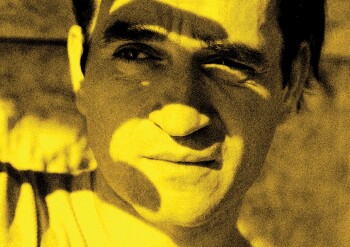
A guest-worker in Germany, Milan (40), discovers that back home in Slovakia his teenage son has become involved with the nationalist-leaning "neighborhood watch" when he is accused of bullying and killing a classmate. The father begins a search for the truth about what happened and the truth about himself…
Marko Škop. Director of the full-length documentary films Other Worlds (2006) and Osadne (2009), both of which received awards at Karlovy Vary IFF. His fiction feature debut Eva Nová (2015) was awarded the FIPRESCI Prize at Toronto IFF.
Artileria was established in 2006 in Bratislava, Slovakia. The film Other Worlds (dir. Marko Škop) won Special Jury Mention at the 2006 Karlovy Vary IFF and was the first ever documentary in the festival's history to win the Audience Award. The company’s second feature length documentary Blind Loves (dir. Juraj Lehotský) had its world premiere at tthe Directors’ Fortnight and won the CICAE Art Cinema Award in Cannes 2008. Artileria's third feature length documentary film Osadne (dir. Marko Škop) was awarded the Best Documentary Film at the 2009 Karlovy Vary IFF. The film Miracle (dir. Juraj Lehotský) won a Jury Mention at the 2013 Karlovy Vary IFF. Eva Nová (dir. Marko Škop) was awarded with the FIPRESCI Prize at Toronto IFF 2015.
I am interested in the theme of an ordinary man who is one of the millions of people that make up a part of the mass xenophobic soul with his own tiny, ignorant particle. He is harshly confronted with the consequences of hatred through events that occur in his own family. I feel that there is only a very thin line between affiliation to our own people – people just like me – on one hand and a broken nose on the other the moment I cease to be in harmony with them. I would like to show how easily we can become enemies of one another. I would like to try to depict evil and the mistakes that can lead to it in our unstable existence.
Artileria, s.r.o.
Drobného 23, 841 01, Bratislava, Slovakia
Email: [email protected]
Mobile: +421 905 261 949
Negativ
Ostrovní 30, 110 00, Praha 1, Czech Republic
Email: [email protected]
 Marko Škop | Director, Producer
Marko Škop | Director, Producer
Email: [email protected]
Mobile: +421 903 789 198
 Petr Oukropec | Producer
Petr Oukropec | Producer
Email: [email protected]
Mobile: +420 602 220 809
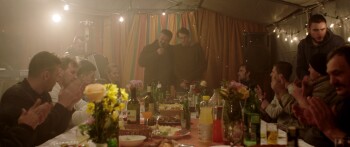
Mamonga is a modern triptych about alienation and incompatibility, depicted through the consequences of the decisions that our female and male protagonist made in their youth. The middle part portrays their lives in a desolate Bosnian town, where they grew up in families offering different possibilities. This conservative town is where a fatal event takes place – he witnesses his friend raping her. The first and the third part show their lives ten years later. She moves to the big city, where she is raising her six-year old autistic child, while he takes a monastic vow of silence in a remote mountain village.
Stefan Malešević was born in Belgrade. He graduated from the PhD film.factory program in Sarajevo where he directed several projects under the mentorship of Bela Tarr. Gora (2017), doc, Best Camera and Film at BelDocs, Serbia 2017; Special Jury Mention at DokuFest, Kosovo 2017; screened at Astra, Romania 2017; Visions du Reel, Switzerland 2018; 2015 The Bucketrider, fiction, screened at Cannes Short Film Corner 2016; Divan FF, Romania 2016; Kino der Kunst, Germany 2016; 2014 A Fine Day for Bananafish, fiction, Jury award at B3F Pogradec, Albania 2015; Best Short at Cinema du Monde Festival, France 2016; screened at Trieste FF, Italy 2015; DIFMF, Ireland 2015; UnDependence, Scotland 2015.
In only seven years of existence, Sarajevo Film Academy became the catalyst in the development of the new generation of young filmmakers from more than 35 countries. From 2013 to 2016, SFA was running the film.factory program led by Bela Tarr.
Selected filmography:
Aragane, 2015, dir: Kaori Oda; Yamagata IDFF 2015 (Special Mention), Doclisboa 2015: International Competition, Mar del Plata IFF 2015: Panorama, Antofadocs 2015: Feature Competition, Taiwan IDFF 2015: Asian Competition
Fine, 2015, dir: Marta Hernaiz Pidal; Cannes IFF Cinéfondation 2016, New York FF 2016, Trieste FF 2017
Lejla, 2016, dir: Stijn Bouma; Cannes IFF Cinefondation 2017, Helsinki IFF 2017, Netherlands FF 2017, Tangiers Mediterranean FF 2017
In three parts, set in different seasons, Mamonga portrays its protagonists as they try to fit into three different environments. Life events have so many perspectives that I always felt it is unfair to pay attention only to the good or the bad. The world of Mamonga is set up accordingly – bad actions lead to good consequences, good intentions to bad results. Using an unorthodox visual approach with long shots, I want to raise the film above the small human drama to the realm of universal and comprehensive understanding of the world. Diverse places (village, city, town) help to portray the diverse destinies of our characters in the ripple-effect narrative structure, which skips ten years back and forth.
NANA 143
Beogradska 3, 15300, Loznica, Serbia
Email: [email protected]
Mobile: +381 611 776 853
SFA - Sarajevo Film Academy
Hrasnička Cesta 3a, 71000, Sarajevo, Bosnia and Herzegovina
Email: [email protected]
Mobile: +38 733 975 060
 Andrijana Sofranić Šućur | Producer
Andrijana Sofranić Šućur | Producer
Email: [email protected]
Mobile: +381 611 776 853
 Aleksandra Cvijetić | Producer
Aleksandra Cvijetić | Producer
Email: [email protected]
Mobile: +381 692 104 222
 Stefan Malešević | Director
Stefan Malešević | Director
Email: [email protected]
Mobile: +381 644 598 763
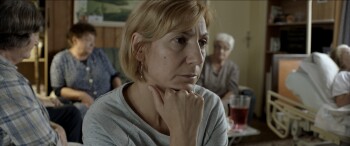
Jasna returns to her home town to take care of her dying mother. But even while lying bedridden, her mother's immobile body still radiates a daunting authority over those who surround her. As days go by, Jasna gets tangled in the web of grudges that she was desperately trying to escape. Will she finally confront her mother or lose herself in her smothering embrace?
Jure Pavlović (b. 1985) graduated in Directing at the Academy of Dramatic Art in Zagreb, Croatia. He took part in various international workshops like Berlinale Talents, Sarajevo Talent Campus, Sources 2, etc. His short films have been screened at more than 200 film festivals such as Berlinale – Berlin International Film Festival and Clermont-Ferrand, winning more than 30 awards. His short film Picnic won the European Film Academy Award (EFA) for Best European Short Film in 2015. Matriarch is his debut feature fiction film.
Bojan Kanjera studied law at the Faculty of Law in Zagreb. He gained production knowledge by participating in various international educational programs such as EAVE – Film Marketing Workshop, EuroDoc, Torino Film Lab, MAIA, MBS, I-DOC, BDC and others. As a producer, he is currently developing new feature films of leading Croatian directors of the younger generation such as Jure Pavlovic (PICNIC, EFA – best short 2015). So far, Bojan has produced several feature length films, Lada Kamenski (dir. S.Hribar, M.Šantić), Home (dir. D.Pleić, ex. producer), Jimmie (dir. J.Ganslandt, minority co-producer), and Tiny Tim (dir. J. von Sydow, minority co-producer), and has worked on numerous documentaries and short films as well as TV formats, commercial and documentary audio-visual projects.
The film grew out of my own coming to terms with the most basic fact of life: the death of a loved one. Death bereaves us of the possibility for closure, especially if there are issues left unresolved. This is why death is a potent catalyst that forces us to confront the ghosts of our past. The cinematic language used in the film is radical and articulates this notion on the visual level. It consists of long, continuous, single-take sequences, with the camera’s focus always locked solely on Jasna, the protagonist. By evading conventional storytelling techniques, the formal elements are used to challenge the expectations of the viewer in the same way that Jasna's sense of herself is constantly challenged throughout the story.
Sekvenca
I.B.Mažuranić 60, 10000, Zagreb, Croatia
Email: [email protected]
Mobile: +38 598 789 191
Wake Up Films
Milete Jakšića 12, Novi Sad, Serbia
Email: [email protected]
Mobile: +381 628 919 186
 Jure Pavlovic | Director
Jure Pavlovic | Director
Email: [email protected]
Mobile: +38 598 559 640
 Bojan Kanjera | Producer
Bojan Kanjera | Producer
Email: [email protected]
Mobile: +385 915 842 322

Monsters follows the last 24 hours of Dana and Arthur as a married couple. Through a series of encounters, the two 40-year-olds come to question whether the biggest proof of love is to let go. The film is structured in three parts. The first one is about Dana, who convinces a cab driver to stay with her for the night; the second is about Arthur and his encounter with a random gay man. These are shot in 1:1 ratio and they happen at the same time – only in the third part do we see Dana and Arthur in Cinemascope, as a couple on what could have been a normal day. Her rejection of motherhood, his sexuality and fears, and society and family values are all pieces of the puzzle we come to discover.
Through his short films as a writer-director, Marius Olteanu has chosen to focus on the clash between private and social life and the boundaries that stem from it. His last two shorts, Tie (which was the starting point for his feature debut Monsters) and No Man’s Land were selected for more than 30 festivals – Busan IFF, Tallinn POFF, Namur FIFF, TIFF etc. These films show his interest in searching for what lies beyond the perfect surface of things and finding new cinematic ways to convey the struggle with one’s own limits. Marius is also a published photographer.
Claudiu Mitcu, born in 1976, is a Romanian film producer and director. He has directed several documentaries, The Merry Circus, Australia, and The Network co-produced by Parada Film and HBO Romania, The Village Called Sands, Two of Us, Maria, Easter Memorial and produced documentary films The Trial, Party and Contest in Ciupelnita, Dream Images; short films include Miss Sueno, No Man's Land, Tie, Bad Penny, My Name is Costin, co-production of the short film Kowalski and Ramona by Andrei Cretulescu, awarded in Cannes 2015 at Semain de la Critique with the Canal + Award. In 2010 received Honourable Mention for Australia by the National Union of Filmmakers, the Human Rights Prize from the French Embassy in Romania for Australia and Two of Us.
Monsters is based on a series of real-life interviews with married people. It chooses to speak about two partners who, through their particularities, are loved as a couple but despised as individuals. Showing the last 24 hours of this couple, Monsters is a necessary film in its context and character background. It is shaped as a puzzle in three parts, in which we get to know the two characters through diverse encounters with strangers, who aren’t lacking in dark humour and absurdity. Finally, the loneliness and inability to fit in turns them into monsters. The film plays with ratios and formats in order to visually grasp human limitations and boundaries of the social world.
Parada Film
30 Vasile Lascar, 030167, Bucharest, Romania
Email: [email protected]
Mobile: +40 212 524 867
 Marius Olteanu | Director
Marius Olteanu | Director
Email: [email protected]
Mobile: +40 726 127 136
 Carla Fotea | Executive Producer
Carla Fotea | Executive Producer
Email: [email protected]
Mobile: +40 754 090 595
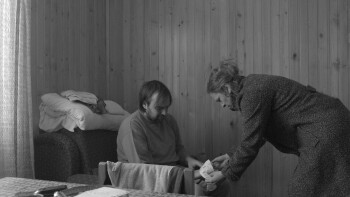
Dejan, even though he is almost thirty, is still a virgin. He tries to repress the turmoil he feels, which is caused by living under the same roof with his drunken father and overprotective mother, to see if he can actually go beyond just friendship with Kaća, a nice girl he works with. After the local psychic humiliates him during the séance, Dejan realizes he has nothing to lose. Empowered by this realization, he attempts to make his life at least bearable.
Marko Djordjevic, born 1988, Kragujevac, Serbia. In 2014, he finished his master’s studies in Film and TV Direction at the Faculty of Dramatic Arts in Belgrade. He has written and directed these short films (selected filmography): Na Drugoj Obali / The Other Shore – Cinema City 2012, Best Serbian Film in the Up to 10,000 Bucks category; FSF (Festival of Student Film) Belgrade 2012, Best Balkan Film; Gde je Nađa? / Where is Nadia? – a feature length “omnibus film” – Cinema City 2013, Special Jury Prize; Ujed pčele u Velikim Pčelicama / Bee Stung in Big Little Bees – special mention, Bašta Fest 2017; My Morning Laughter is his first feature film currently in post-production.
Miloš Pušić (b. 1980) is a director and a producer based in Serbia. His films have been screened and awarded at festivals worldwide. Autumn in my Street, a 2009 feature, Cinemacity (Serbia) – Best Photography Award and Special Jury Award. It premiered at Sarajevo Film Festival, main competition. Withering, 2013. feature, premiered at KVIFF, Cinema City film festival – Serbia (Best Actress), Montenegro Film Festival – Montenegro (Best Actress), Cottbus (Ecumenical Jury Award), Niš – Serbia (Best Actor, Actress. Supporting Actor and Actress, Best Young Actress), Athens – Greece (Audience Award), Luxor (Best Film), Sopot – Serbia (Best Film, Music, Actor, Screenplay), Skip City Film Festival – Tokyo, Japan; Thessaloniki...
My Morning Laughter is a coming-of-age movie, but with one big exception: the main protagonist is not a teenager but a 30-year-old virgin. In a broader sense it is a story about my generation, a generation that was overprotected by its parents, who did their best at shielding us from the awful reality that was lurking outside of our homes. This film was not made by thinking about the form of any other film. It was made out of the curiosity for life and the minutiae of it, which become so grand when a camera is in the right place and the actors are in sync. All the big questions of life and death exist in the film. However, my job was to disregard that. Instead, I made sure that every scene showed what people were truly like, hoping that the bigger picture would be revealed as a result.
Altertise
Backa 3, 21000, Novi Sad, Serbia
Email: [email protected]
Mobile: +381 646 685 982
Cinnerent
Stevana Brakusa 1, 11000, Belgrade, Serbia
Email: [email protected]
 Miloš Pušić | Producer
Miloš Pušić | Producer
Email: [email protected]
Mobile: +381 646 685 982
 Marko Djordjevic | Director
Marko Djordjevic | Director
Email: [email protected]
Mobile: +381 641 737 946
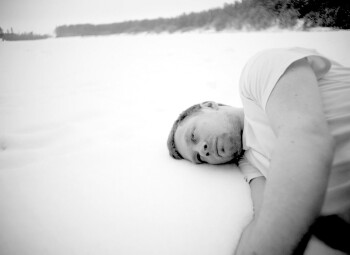
In order to solve his debt problems, Oleg the butcher decides to immigrate to Belgium. He has the chance to work in his profession, but his alien status makes things difficult – a middleman is a must, and this individual takes half of Oleg’s salary. After a conflict at work, Oleg finds himself in a foreign country with no income. He accepts the offer to work for a new acquaintance, Andrzej, and moves into a house of Polish immigrants. Slowly Andrzej’s real nature comes out. After providing Oleg with a fake passport, he promises to find him a job in his profession. Promises are not kept and step by step Andrzej breaks Oleg physically and psychologically.
Juris Kursietis started his career at the age of 20 when he began working for the Latvian Television news department as a foreign news correspondent. After six years in television, he turned to cinema. He went to the UK to do his master’s in film directing at the Northern Media School. He graduated his film school with distinction and his mid-length (42-minute) graduation fiction film received attention in the UK and Latvia. Juris Kursietis’ debut film Modris premiered in the 2014 official selection of Toronto International Film Festival, received Special Mention at San Sebastian Film Festival and the Best Director Award – Silver Prometheus at Tbilisi International Film Festival. Oleg is his second feature.
Founded in 2011, Tasse Film is an administrative and creative production team led by two experienced producers – Aija Berzina and Alise Gelze. The company’s first feature-length production Mellow Mud (directed by Renars Vimba) had its world premiere at Berlin International Film Festival 2016, where it received a Crystal Bear for the Best Film in the Generation 14 Plus section. In 2017, Tasse Film released the Latvian, Polish and Lithuanian co-production Foam at the Mouth (directed by Janis Nords), which received the Film Critics Award at Moscow International Film Festival 2018. This spring, the family film Paradise 89 (directed by Madara Dislere) was released as part of the programme of Latvian Films for a Latvian Century. The film attracted over 53,000 visitors to local cinemas.
Oleg is a man’s initiation into manhood. Looking from this perspective, it is very easy to understand the initial attempts of Oleg’s actions, i.e. to go abroad alone and accept his financial abilities and personal weaknesses. In modern society, the question of initiation into manhood becomes increasingly important – men in their thirties are still lacking decisiveness. Oleg also portrays modern day slavery in the very heart of Europe – Brussels. Forced by various circumstances, people head to other countries to work in order to earn a livelihood, but the huge impersonal mechanism gives rise to the possibility of being exposed to inhuman conditions. Whatever Oleg’s character may be, no one deserves to end up under the physical and psychological terror that Andrzej uses on him.
Tasse Film
Kr. Barona 32-6, LV1011, Riga, Latvia
Email: [email protected]
Mobile: +37 126466014
 Alise Ģelze | Producer
Alise Ģelze | Producer
Email: [email protected]
Mobile: +37 126 156 356
 Juris Kursietis | Director, Scriptwriter
Juris Kursietis | Director, Scriptwriter
Email: [email protected]
Mobile: +37 126 767 280
 Aija Berzina | Producer
Aija Berzina | Producer
Email: [email protected]
Mobile: +37 126 466 014
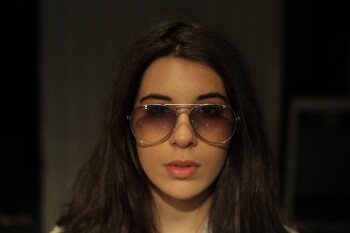
The plot takes place over the course of one night and combines three storylines: the conflict between a Protestant priest and his family; the parenting struggles of a political activist with her teenage daughter; and the marriage crisis of a middle-aged actor and his wife.
Szabolcs Hajdu is a Hungarian screenwriter, actor, film and theatre director. His 2006 film White Palms premiered at the Festival de Cannes – Quinzaine de Réalisateurs and received Special Mention from the jury of the East of the West Competition section at the 41st Karlovy Vary International Film Festival. Bibliotheque Pascal (2010) premiered at Berlinale and went on to win numerous awards all over the world. Both were selected as the Hungarian entry for the Academy Awards in 2010 and 2011. His 6th film, Mirage, was released in 2014 at Toronto International Film Festival. Szabolcs Hajdu's latest work, It’s Not the Time of My Life (2016) premiered at Karlovy Vary International Film Festival and won the Crystal Globe Award for Best Film and Best Actor (Szabolcs Hajdu).
The intertwining stories of Treasure City are mundane little affairs. These little things are exactly what we want to show, as we believe that what is invisible on an ordinary day will be visible on film. This way the tiny becomes identifiable and provides orientation and consolation to the viewer. Our film is a special educational project as well, with the majority of the staff composed of students interested in film, who are led by experienced filmmakers through the process of feature film creation. Treasure City is realized independently from any type of state funding, thereby protesting as a free-thinking critical art.
Art-Játék Egyesület
Testvériség str. 5, 1165, Budapest, Hungary
Email: [email protected]
Mobile: +36 204 843 704
 Szabolcs Hajdu | Director
Szabolcs Hajdu | Director
Email: [email protected]
Mobile: +36 703 283 868
 Jim Stark | Producer
Jim Stark | Producer
Email: [email protected]
First-hand brews throughout the year.
Be among the first to learn about upcoming events and other news. We only send the newsletter when we have something to say.